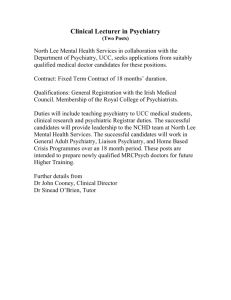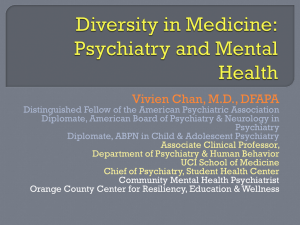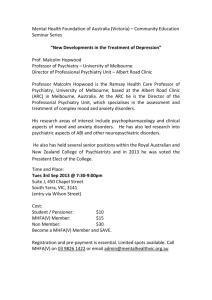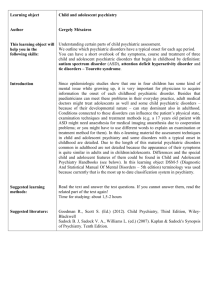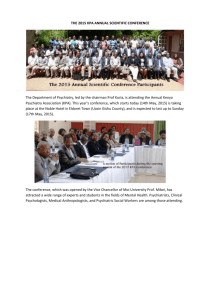Dr. Oberstar, Adolescent Psychiatrist
advertisement
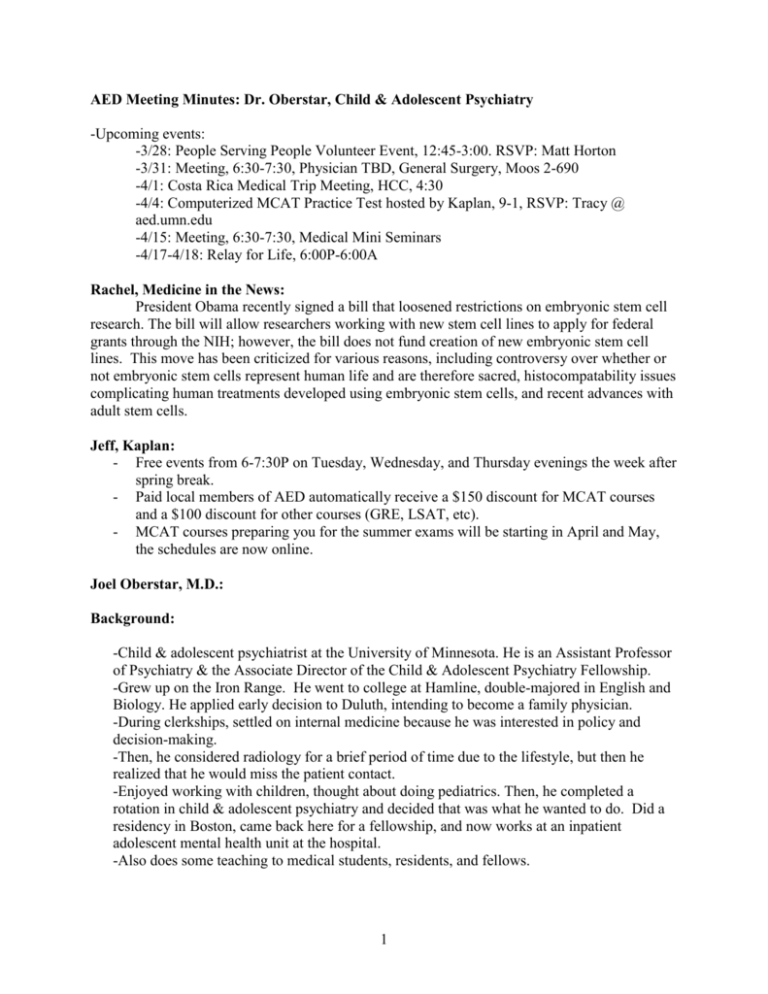
AED Meeting Minutes: Dr. Oberstar, Child & Adolescent Psychiatry -Upcoming events: -3/28: People Serving People Volunteer Event, 12:45-3:00. RSVP: Matt Horton -3/31: Meeting, 6:30-7:30, Physician TBD, General Surgery, Moos 2-690 -4/1: Costa Rica Medical Trip Meeting, HCC, 4:30 -4/4: Computerized MCAT Practice Test hosted by Kaplan, 9-1, RSVP: Tracy @ aed.umn.edu -4/15: Meeting, 6:30-7:30, Medical Mini Seminars -4/17-4/18: Relay for Life, 6:00P-6:00A Rachel, Medicine in the News: President Obama recently signed a bill that loosened restrictions on embryonic stem cell research. The bill will allow researchers working with new stem cell lines to apply for federal grants through the NIH; however, the bill does not fund creation of new embryonic stem cell lines. This move has been criticized for various reasons, including controversy over whether or not embryonic stem cells represent human life and are therefore sacred, histocompatability issues complicating human treatments developed using embryonic stem cells, and recent advances with adult stem cells. Jeff, Kaplan: - Free events from 6-7:30P on Tuesday, Wednesday, and Thursday evenings the week after spring break. - Paid local members of AED automatically receive a $150 discount for MCAT courses and a $100 discount for other courses (GRE, LSAT, etc). - MCAT courses preparing you for the summer exams will be starting in April and May, the schedules are now online. Joel Oberstar, M.D.: Background: -Child & adolescent psychiatrist at the University of Minnesota. He is an Assistant Professor of Psychiatry & the Associate Director of the Child & Adolescent Psychiatry Fellowship. -Grew up on the Iron Range. He went to college at Hamline, double-majored in English and Biology. He applied early decision to Duluth, intending to become a family physician. -During clerkships, settled on internal medicine because he was interested in policy and decision-making. -Then, he considered radiology for a brief period of time due to the lifestyle, but then he realized that he would miss the patient contact. -Enjoyed working with children, thought about doing pediatrics. Then, he completed a rotation in child & adolescent psychiatry and decided that was what he wanted to do. Did a residency in Boston, came back here for a fellowship, and now works at an inpatient adolescent mental health unit at the hospital. -Also does some teaching to medical students, residents, and fellows. 1 Psychiatry: -Psychiatry: why people do the things they do. Taking the theories developed from the study of the nervous system and translating them into human behaviors. -20% of the US population suffers from a mental illness. This includes anxiety disorders, depression, substance use disorders. There are numerous effective treatments for these disorders. -18 of 37 past U.S. presidents studied had mental illnesses. 14 had symptoms while in office! J. Adams – Bipolar II J.Q. Adams – Major Depressive Disorder (MDD) Lincoln – MDD with psychotic features Grant – social phobia, alcoholic dependence, phobia of blood T. Roosevelt & L.B. Johnson – Bipolar I -Many famous people struggled with mental illness. -We as a society stigmatize mental illness. We’re getting better at it, but it’s still not perfect. Pathway to Psychiatry: -4 years of medical school followed by 4+ years of psychiatry residency. Picking your specialty can be a very difficult decision. Psychiatrist vs. Psychologist -Psychiatrists can prescribe medications; psychologists cannot. Psychologists usually attend graduate school after undergraduate, followed by a 1 year internship. Questions: 1. Can you talk a little bit about wear & tear on you personally from working with children in such delicate situations? It is hard – you have to be able to make a connection with a person in a different way. If you are good, and lucky, they spill their guts. You do have to work at separating your work from your personal life. There are many traumatic and difficult situations that you will face, regardless of specialty. My defense mechanism is humor. You have to find a way to empathize with patients without getting too close & compromising yourself. 2. Do you find a balance between medication and therapy for your patients? What has happened in medicine in general has been a massive shift towards subspecialization. Much of my practice is focused on medicine because that’s what people need. I don’t do much psychotherapy – 30 minute sessions at the max. One of the luxuries of being a psychiatrist rather than a psychologist is that you have the flexibility and the knowledge base to do both. 3. What do you think about Scientology & their stance on psychiatry? The tough part about psychiatry is that it is not as precise as some other specialties. There are a lot of unanswered questions. I try to be straightforward with patients and tell them what I 2 know and what I don’t know. A lot of the medications I prescribe are very dangerous. I think the scientologists have a different approach. 4. Do you get a lot of referrals from other specialties? Some illnesses are impossible to figure out – often it involves simply ruling out a negative. The hard part with somatic issues is that a lot of it is mental. Factitious disorders occur when patients ‘fake’ an illness with ulterior motives – the fun part of psychiatry involves discovering the motives behind these sorts of disorders and then treating the root causes. 5. Do you see a lot of borderline personality disorders? Yes, especially in patients admitted with self-destructive behaviors (i.e. cutting). They can’t handle their emotional responses to situations which normally wouldn’t cause those high amounts of distress in ‘normal’ people. Treatment involves providing them with skills to handle their emotions. 3


